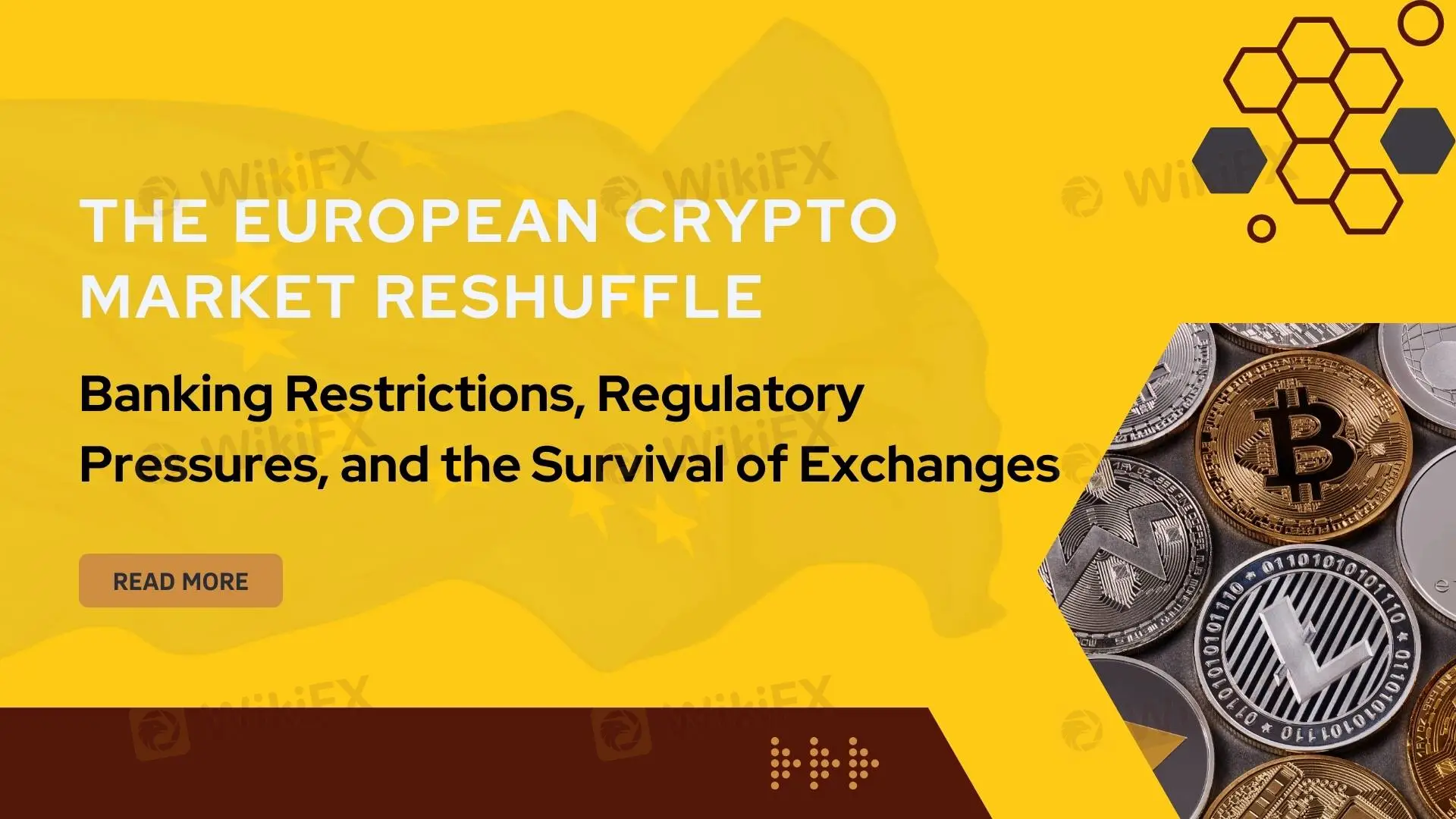简体中文
繁體中文
English
Pусский
日本語
ภาษาไทย
Tiếng Việt
Bahasa Indonesia
Español
हिन्दी
Filippiiniläinen
Français
Deutsch
Português
Türkçe
한국어
العربية
European Crypto Market Shakeup: Banking Limits, Regulatory Pressures, and Exchange Survival
Abstract:Portugal’s BiG bank blocks fiat transfers to crypto platforms. European crypto platforms face mounting challenges amid regulatory changes.

One of Portugal‘s leading banks, Investimentos Globais (BiG), recently announced it will block customers from transferring fiat currencies to cryptocurrency platforms. In its statement, BiG explained that this decision aligns with regulatory guidelines issued by the European Central Bank (ECB), the European Banking Authority (EBA), and the Portuguese Central Bank regarding the risks associated with digital assets. The policy also aims to ensure compliance with the country’s Anti-Money Laundering (AML) and Countering the Financing of Terrorism (CFT) laws.
This decision has garnered significant attention, not only because BiG is a key financial institution in Portugal managing €7 billion in assets but also due to its implications for the crypto industry. While other banks, such as Caixa Geral de Depósitos, still permit fiat transfers to crypto platforms, BiGs policy reflects the increasing regulatory pressure on the digital asset sector.
Attitudes of European Governments, Banks, and Exchanges
1.Government Regulatory Upgrades
In recent years, European governments and regulators have adopted a stricter stance on digital assets. The introduction of MiCAR (Markets in Crypto-Assets Regulation) established a unified regulatory framework for the European crypto market, aimed at enhancing investor protection, combating money laundering, and promoting market transparency. This regulation raises the compliance bar for Crypto Asset Service Providers (CASPs) and mandates strict monitoring of funds related to digital assets by banks.
2.Banks Risk Mitigation
For banks, cryptocurrency‘s volatility and its potential association with risks like money laundering and illicit financing are significant reasons to restrict transactions. BiG’s policy likely reflects compliance pressures and concerns about regulatory penalties. In contrast, banks such as Caixa Geral de Depósitos have yet to adopt similar measures, highlighting the differing stances among European banks on crypto-related activities.
3.Exchanges Responses
Crypto exchanges responses to regulation vary depending on their size and market strategy. Larger exchanges, such as Coinbase and Kraken, tend to embrace compliance, viewing new regulations as an opportunity to expand market share. In contrast, smaller or non-compliant exchanges face survival challenges, with some forced to exit the market.
Crypto Platforms Reacting to European Regulations
The evolving regulatory environment in Europe has prompted many exchanges to adapt their strategies to comply with MiCAR requirements:
- Binance: Announced its exit from several European markets, including the Netherlands and Austria, partly due to failing to secure local regulatory approval.
- Bybit: Plans to cease services for French users in early 2025, citing the high cost of regulatory compliance.
- OKX: Suspended certain stablecoin pairs, such as USDT, in the European Economic Area (EEA) to comply with upcoming MiCAR mandates.
- Coinbase: Limited services for stablecoins that do not meet MiCAR requirements and ended its USDC rewards program in the EEA.
These actions indicate that, while the European market holds significant potential, its complex regulatory environment is prompting some platforms to reassess their strategies in the region.
Disclaimer:
The views in this article only represent the author's personal views, and do not constitute investment advice on this platform. This platform does not guarantee the accuracy, completeness and timeliness of the information in the article, and will not be liable for any loss caused by the use of or reliance on the information in the article.
Read more

Bitcoin in 2025: The Opportunities and Challenges Ahead
Bitcoin experienced a transformative year in 2024, with its value surpassing $100,000 and attracting attention from institutional investors, retail traders, and governments alike. This growth was driven by milestones such as the approval of spot bitcoin ETFs and increasing adoption by major financial institutions. As 2025 begins, bitcoin’s position as a cornerstone of the digital financial ecosystem is stronger than ever.

These Four Companies Receive MiCA Crypto Asset Licenses Issued by the Netherlands
Four firms secure AFM licenses, paving the way for regulated crypto operations across the EU under MiCA regulations.

Terra Founder Do Kwon Denies Fraud Allegations in U.S. Court
Do Kwon, the founder of the Terra Luna cryptocurrency ecosystem, has pleaded not guilty to multiple fraud charges following his extradition to the United States.

T3 Financial Crime Unit Freezes $100M in USDT
The T3 Financial Crime Unit, a joint initiative involving the Tron blockchain, Tether, and TRM Labs, has frozen $100 million in USDT connected to criminal activities since its inception in September.
WikiFX Broker
Latest News
Attention! Goldman Sachs Cuts Gold Target to $2910
Inflation Rebounds: ECB's Big Rate Cut Now Unlikely
Carney \considering\ entering race to replace Canada\s Trudeau
High-Potential Investments: Top 10 Stocks to Watch in 2025
US Dollar Insights: Key FX Trends You Need to Know
Why Is Nvidia Making Headlines Everywhere Today?
Discover How Your Trading Personality Shapes Success
FINRA Charges UBS $1.1 Million for a Decade of False Trade Confirmations
Pepperstone Sponsored the "Aston Martin Aramco Formula One Team"
ACY Securities Integrates MetaTrader 5 to Enhnace Copy Trading Service
Currency Calculator






